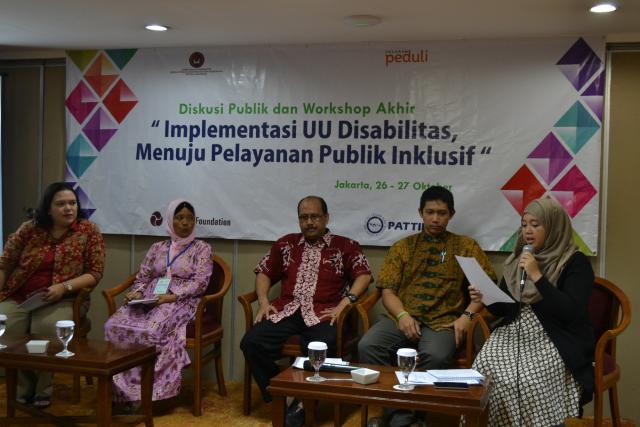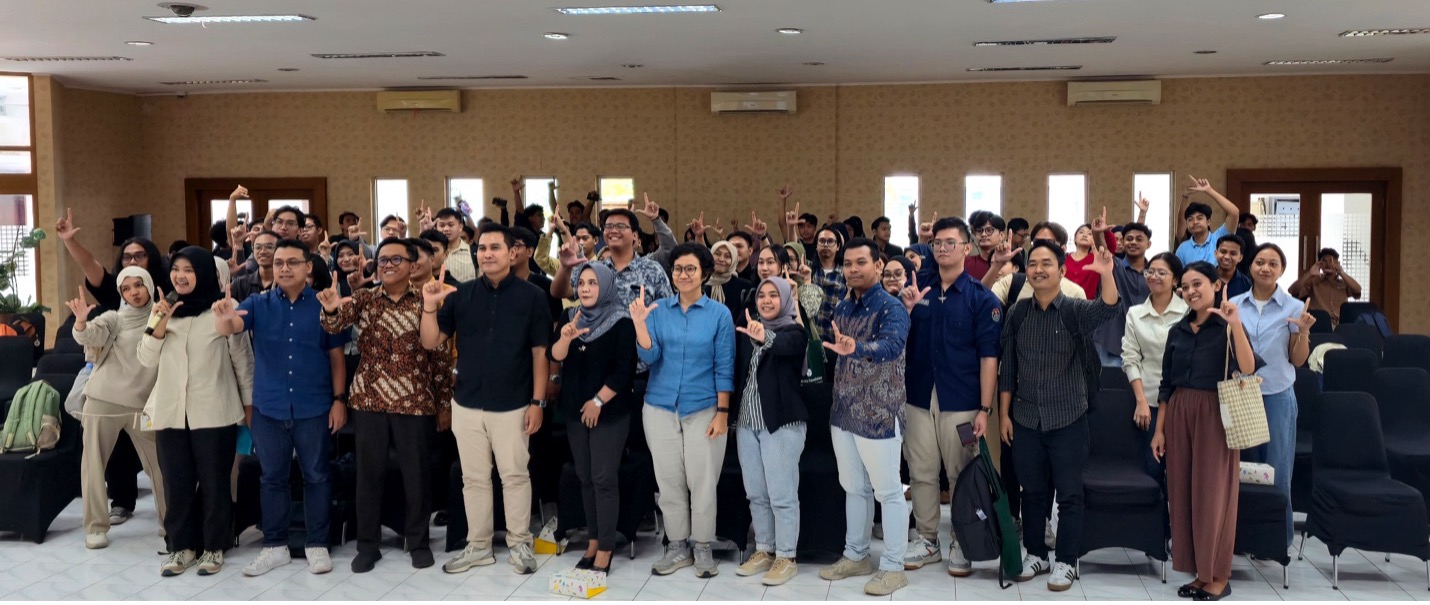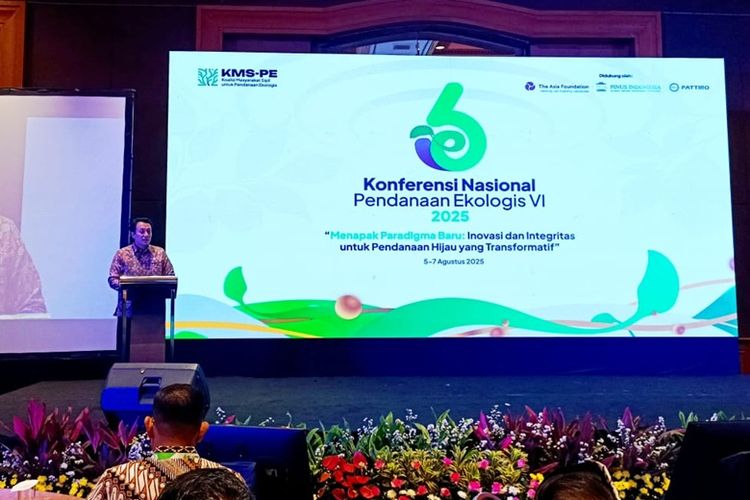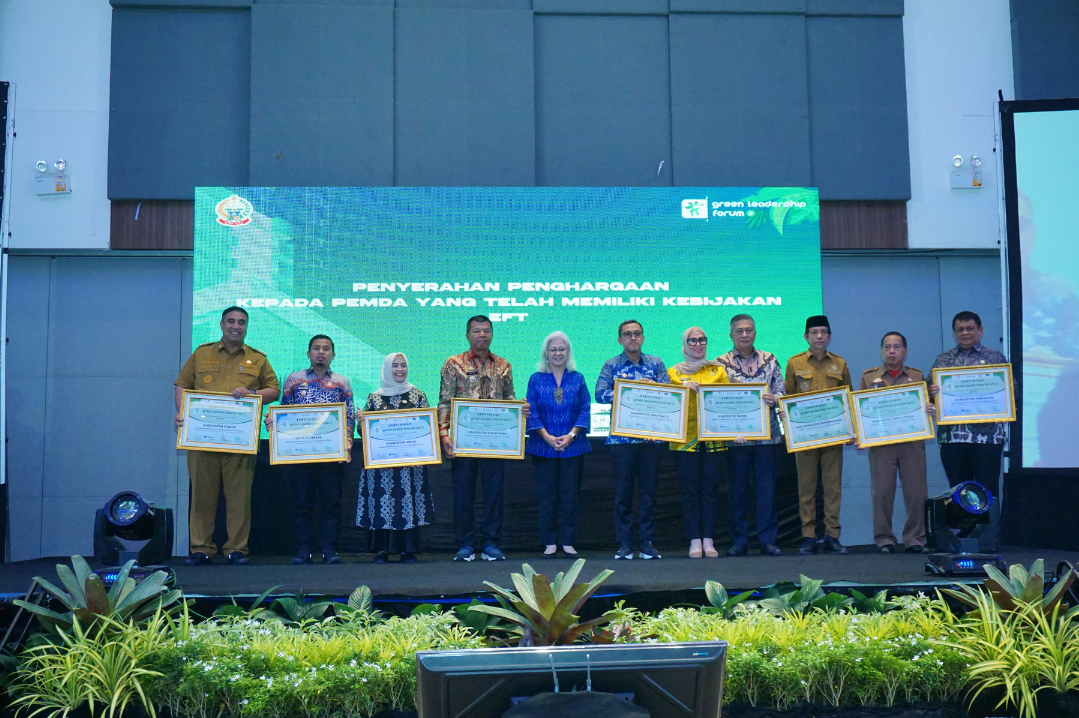
As a form of attention to the problems faced by people with disabilities, the Regional Research and Information Center (PATTIRO) held a public discussion on 26 October 2016 at Cikini, Jakarta. The event with the theme “Implementation of the Disability Law, Towards Inclusive Public Services” is part of a series of closing activities for the Disability Care Program, which has been running since June 2015 in Sorong and West Lombok.
In the event which lasted for two days, PATTIRO also invited the Directorate of Social Rehabilitation of People with Disabilities of the Ministry of Social Affairs, Tina Camelia Zonneveld, Head of the Health Services Division of the West Lombok Regency Social Service, Arbain Ishak, then Iswarni Pujiningrum as Chair of the Communication Forum for Parents with Children with Disabilities (FKOAD) which is the pioneer organization for this program in Sorong Regency, and also Rokhmad Munawir from PATTIRO.
PATTIRO Director, Maya Rostanty explained that this public discussion was held as a forum to convey good practices from program areas in social inclusion in the public health service sector. Apart from that, it is also hoped that this discussion can help identify opportunities for synergy between the government, community social organizations (NGOs) and development partners in supporting the implementation of the Disability Law for inclusive public services.
The event was opened by the Assistant Deputy for Community Empowerment at the Coordinating Ministry for Human Development and Culture, Magdalena. He conveyed the development of the Care Program which has been implemented by the Coordinating Ministry for Human Development and Culture since 2015. It is not only people with disabilities who receive attention from this program, but also minority groups, vulnerable children and teenagers, remote indigenous communities, victims of human rights violations, and transgender people. Unfortunately, Magdalena continued, of the approximately 4.5 million Indonesian people who live in marginalized conditions, this program was only able to reach 950,000 people in the second phase of implementation in 2015-2016.
For this reason, Magdalena emphasized that the problem of social exclusion in Indonesia is not enough just to provide facilities and infrastructure, but also to strengthen social capacity and increase their access to services provided by the government.
In the discussion, Iswarni Pujiningrum or who is familiarly called Ibu Ning shared her experience as a disabled parent in Sorong Regency. Until now, there are still many communities and even families themselves who discriminate against their family members with disabilities. The stigma of disability is often associated with people with disabilities, resulting in a feeling of self-doubt and feeling like they are a burden on the family.
In fact, continued Mrs. Ning, if handled well, children with disabilities will be able to live independently. He also proved to his son that he was independent even though he could only move three fingers. He passed on that enthusiasm to other disabled parents through FKOAD. One of them is through data collection activities in each RT and from the results of that data collection, early detection activities are carried out involving health workers on a voluntary basis.
Exclusionary treatment also often comes from the government. Disabled people are the second group of people who are often forgotten. Public facilities are built without paying attention to their needs. In the case of population administration, for example, many people with disabilities cannot access it because their limitations are not facilitated in fulfilling KTP requirements, such as iris records, fingerprints and signatures. This then has an impact on banking services which require customers to sign.
Regarding this problem, Mrs. Tina Camelia stated that her party had received an explanation from the Directorate of Population Administration. Actually, not all of these recordings have to be fulfilled, just one of them is enough. Unfortunately, this information does not reach each region precisely. As an option, an agreement to accelerate obtaining identity for disabled people has been prepared between the Ministry of Social Affairs and the Ministry of Home Affairs (Kemendagri). His party has discussed a card for people with disabilities which will refer to the Population Identification Number (NIK).
This population administration problem also has an impact on health services where people with disabilities cannot access National Health Insurance (JKN). In West Lombok, for example, Mr. Arbain Ishak from the Health Service (Dinkes) stated that not all health facilities are classified as accessible for people with disabilities. Moreover, there are no regional regulations governing public services for people with disabilities. So when faced with budget problems, the Health Department is confused about finding a solution.
Therefore, through this Disabled Care Program, the collaboration between the Health Department and PATTIRO has produced a breakthrough to overcome this problem, namely providing disabled-friendly facilities in community health centers through the Disability-Friendly Community Health Center (RPRD) pilot program, such as ram handles for the blind, wheelchair ramps, and including officers who are able to communicate with people with disabilities. In the initial stage, there were already four community health centers running the program. The hope is that with the preparation of the West Lombok Regency Regional Regulation on Inclusive Education and Health which has entered its final stages, the RPRD program can expand to all community health centers. Apart from that, together with disabled groups, the Health Office and community health centers have also facilitated the production of 165 JKN cards for disabled people who already have a NIK.
On the same occasion, Rokhmad Munawir emphasized that the main aim of Law no. 8 of 2016 concerning disability is a change in society. Therefore, there are several things that need to be considered in realizing inclusive public services in accordance with the Law, namely the willingness to change, in terms of policy and behavior, innovation in public services. There is often a fear of overlapping several policies at the regional level with the regulations above them. Therefore, it is important that there is collaboration between parties, both at the national and regional levels, to formulate strategies to create successes.
Regarding the implementation of Law No. 8 of 2016 concerning Persons with Disabilities, Mrs. Tina Camelia said, the Ministry of Social Affairs has mapped out which Government Regulations (PP) should be prioritized. The regulations that will be drafted are not only mandated by the Ministry of Social Affairs, but also by related ministries such as the Ministry of Education and Culture, the Ministry of Transportation, the Ministry of Public Works, etc. Therefore, the Ministry of Social Affairs has asked for assistance from the cooperation of the Coordinating Ministry for Human Development and Culture and Bappenas to encourage other ministries to immediately prepare the PP which has been mandated by Law no. 8 of 2016.
To conclude the discussion, Magdalena or who is familiarly called Mrs. Meggy added that the Coordinating Ministry for Human Development and Culture and the Ministry of Social Affairs were not “champions” who could implement the law themselves. Needs support from local government. “We really hope that there will be operational input from regional friends who have more direct contact with the problems of people with disabilities,” stressed Mrs. Meggy.
The activity itself was attended by several representatives of stakeholders who collaborate with PATTIRO and make the Disabled Care Program a success, such as the Sorong Regency Social Service (Dinsos), Sorong Regency Secretariat Legal Section, Sorong Regency Aimas Health Center, Labuapi Health Center and Community Health Center Lingsar from West Lombok Regency, disabled organization from West Lombok Regency, P3D Kec. Labuapi. Also present were representatives from Disabled Care Program partners such as SAPDA Yogyakarta, BAHTERA Sumba, and YASMIB South Sulawesi; representatives of disabled organizations and CSOs in Jakarta, such as PERTUNI (Indonesian Blind Association), PSHK (Center for Law and Policy Studies), IPC (Indonesian Parliamentary Center), PATTIRO Raya colleagues from Banten and South Sulawesi; as well as disability issue activists who were involved as participants.
Author: Riska




